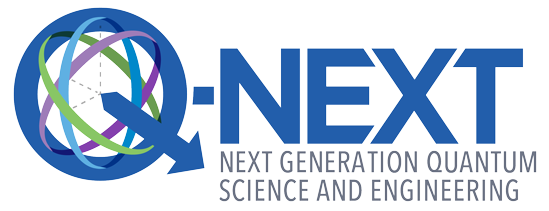In the News
-
Building the quantum workforce of tomorrow
From the University of Chicago: A new certificate course at the University of Chicago prepares workers to join the quantum industry. Read More
-
Aliens could send us quantum messages from space, physicists say
From Popular Mechanics: Q-NEXT Director David Awschalom weighs in on the possibilities for quantum communication on Earth and in outer space. Read More
-
5 important scientists of today
From Discover: Q-NEXT collaborator Monika Schleier-Smith is featured in this piece on scientists who "embody the chief objectives of science — to push the frontiers of what we know and to advance human welfare along the way." Schleier-Smith controls quantum entanglement to augment the computational problems that quantum physics can solve. Read More
-
A faster, better approach to describe many-body systems
From Pacific Northwest National Laboratory: Q-NEXT collaborator Bo Peng and team maintain accuracy while cutting computational using a hybrid quantum-classical approach to model many-body physical systems. Read More
-
Chicago Quantum Profile: Alex High
From the Chicago Quantum Exchange: Alex High, a professor at the Pritzker School of Molecular Engineering at the University of Chicago, focuses on the delicate manipulation of light at very small scales — a useful capability for advanced technology such as quantum communication or quantum sensing. Read More
-
Liang Jiang (BS '04), quantum physicist
From Caltech: As an undergraduate at Caltech in the early 2000s, and then returning as a postdoctoral scholar after completing his Ph.D at Harvard, Q-NEXT collaborator Liang Jiang was present at the creation of two milestones in the history of quantum information at Caltech. Jiang currently pursues research that connects theory to application in the many facets of quantum science, including sensing, transduction, communication and computation. Read More
-
Cryptography solutions selected to fight cyberattacks from quantum computers
From Tech Monitor: University of Chicago scientist and Q-NEXT collaborator Bill Fefferman is quoted in this piece on the new NIST cryptography standards, designed to ensure companies are prepared for the threat posed by quantum computing. Read More
-
UChicago scientists invent ‘quantum flute’ that can make particles of light move together
From University of Chicago: Q-NEXT collaborator David Schuster and team have invented “quantum flute” that can coerce particles of light to move together in a way that’s never been seen before. The breakthrough, reported in Physical Review Letters and Nature Physics, could point the way toward realizing quantum memories or new forms of error correction in quantum computers and observing quantum phenomena that cannot be seen in nature. Read More
-
Chemist Randall Goldsmith named a Schmidt Science Polymath
Q-NEXT collaborator Randall Goldsmith exploits quantum processes to focus on single molecules. His approach to studying chemical and biophysical systems caught the attention of Schmidt Futures, which named Goldsmith one of its 2022 Schmidt Science Polymaths award winners. Each of the 10 recipients, who are newly tenured university faculty chosen for their promising interdisciplinary research, receives $2.5 million over five years to help fund their research groups. Read More
-
Global quantum alliances forged at London colloquium led by UChicago
From the University of Chicago: Leaders in quantum science, economics, defense, and data science from the United States and the United Kingdom met in London for a Quantum and Data Science Workshop hosted by the University of Chicago. The two-day conference gathered key representatives from both countries to forge new alliances and strengthen existing partnerships in the global race to establish quantum technology and explore the growing data science industry. Read More
News and features
See all news and features-
Design rules and synthesis of quantum memory candidates
From the University of Illinois Urbana-Champaign: Researchers use density functional theory calculations to identify possible europium compounds to serve as a new quantum memory platform. They also synthesize one of the predicted compounds, a brand new, air-stable material that is a strong candidate for use… Read More
-
‘Ruler for light’ could enable detailed measurement in personal devices
Frequency combs have revolutionized precision measurement, but the bulky, power-hungry devices are limited to lab settings. A new efficient laser “microcomb” developed by Stanford researchers could bring that revolution to the handheld electronics realm. Read More
-
Resurrecting niobium for quantum science
For years, niobium was considered an underperformer when it came to superconducting qubits. Now scientists supported by Q-NEXT have found a way to engineer a high-performing niobium-based qubit and so take advantage of niobium’s superior qualities. Read More
-
Researchers from startups, government labs and academia develop new techniques for making qubits out of erbium
Argonne project addresses quantum technology challenges and highlight sthe versatility of a rare-earth metal used in lasers and to color glass. Read More
-
Meet Edward Schmitt, facilities engineer
Former Marine Corps electronics technician Edward Schmitt keeps the Argonne Quantum Foundry running while advocating for veterans. Read More
